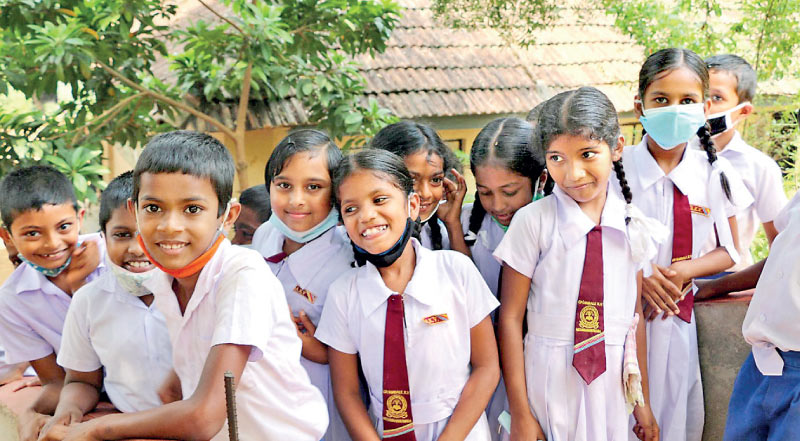Monday Feb 16, 2026
Monday Feb 16, 2026
Monday, 18 December 2023 00:00 - - {{hitsCtrl.values.hits}}

 The education system in Sri Lanka was, for several decades, one that worked well despite the downfall of many other sectors. Education is the fundamental backbone of the success of a country, society, and the individual. Our education system played a crucial role in this success. Many highly successful Sri Lankans, making significant contributions within the country and around the world, are indebted to that system. However, I have doubts whether the good old system is still effective or future-ready.
The education system in Sri Lanka was, for several decades, one that worked well despite the downfall of many other sectors. Education is the fundamental backbone of the success of a country, society, and the individual. Our education system played a crucial role in this success. Many highly successful Sri Lankans, making significant contributions within the country and around the world, are indebted to that system. However, I have doubts whether the good old system is still effective or future-ready.
The world is a very different place now. Technology and paradigms have shifted rapidly, but our curriculum has not kept pace. Even when introducing new knowledge, old information appears to persist. Instead of renewing the curriculum, there seems to be a tendency to add to the existing content base.
In today's world, classrooms are smaller, with about 20-25 students, following the new global methods. These cohorts engage in activity-based education where self-learning takes a key place. If these groups are mixed gender as well as multicultural/multi-ethnic, it's even better so that children learn co-existence as well as to respect each other from a young age. Self-research, discussions, presentations, and reports hold important positions in the new world of education. Traditional note-taking and filling books with information read out by teachers are practices of yesteryear.
Today's education systems are collaborative, not highly competitive. The exam-based, exam-driven education system has no place in the new world. A knowledge, skills, and attitudes-driven system needs to take its place.
Education medium should completely change to English
English is the world's linking language. Unfortunately, the English competency of our youth has fallen to low levels. Even senior government officers and some private sector professionals do not speak or write the language well anymore. This was quite different a few decades ago. What changed? Sinhala/Tamil-based education over generations has resulted in a teacher population that is weak in English too. The level of English in the society would dwindle further with this erosion in the language ability of teachers. English is the medium to acquire global knowledge. It is the link to the world. Aren't we breaking that bridge?
I am one who believes that our education medium at all levels should completely change to English. Sinhala and Tamil can be secondary languages taught (as opposed to the primary teaching language). But with the current teacher population, how do we achieve that? It's a chicken and egg problem, but strategies must be developed to get there, under a phased approach that gets completed within a five year period. It has to start, at least now, before it's too late.
School education should be largely a free education system in Sri Lanka, ensuring the right to education for those who may not be economically sound. It’s a reality that has to be accepted.
Need to democratise higher education
However, higher education is a different story. I don't think it has to be fully free. For one, it is given free only for a small segment; the rest are deprived of it anyway. So, it's fairer if everyone pays for it, ideally, a system where students can get loans and repay them when they are employed. Obviously, the marks system is still important so that students, as well as universities, know who suits what course. As higher education gets democratised in a way that anyone who wants it is empowered to get it, the existing highly competitive system can be phased out.
The competitiveness is inherent when there are limited opportunities. However, if there are more opportunities created by the government, the private sector and international education providers that are driven commercially, the limitation will automatically fade away.
This system of responsible education would also ensure students select fields with high levels of employability, knowing they have to pay back later. This would in turn ensure the country builds skills required by the economy. For instance, we develop thousands of Arts graduates through government spending, and then find there are no jobs for them in the economy, so that the Government ends up creating meaningless jobs. It's a double loss.
Policies, attitudes need significant change
We spoke about making Sri Lanka a knowledge hub over a decade ago, with no real progress to date. No major movements in foreign universities coming in. No major inflow of foreign students either. Not only policies but attitudes need a significant change to pave the way for such transformation. These changes will reduce dollars going out, as spending on foreign higher education would lessen while it would increase dollars coming in, with foreign students bringing in much-needed revenue. But, are we mentally ready to make the changes required for this to take place?
All this is no easy task. One single person cannot do it, but a national strategy should come in, where a collective effort can be taken. Tough, but doable. Certainly, a need of our times.
(The writer is a tech professional currently based out of Singapore. He has previously worked in Sri Lanka, India, Australia, USA, and the UK and travelled to over 20 countries for professional engagements. He is a past President of the Computer Society of Sri Lanka (CSSL), has run a tech education business in Sri Lanka and worked for multinational companies such as Meta and Accenture. He has authored 4 books and over 250 articles)